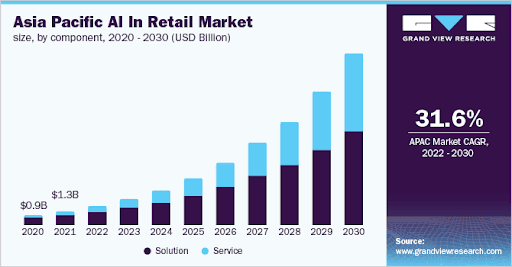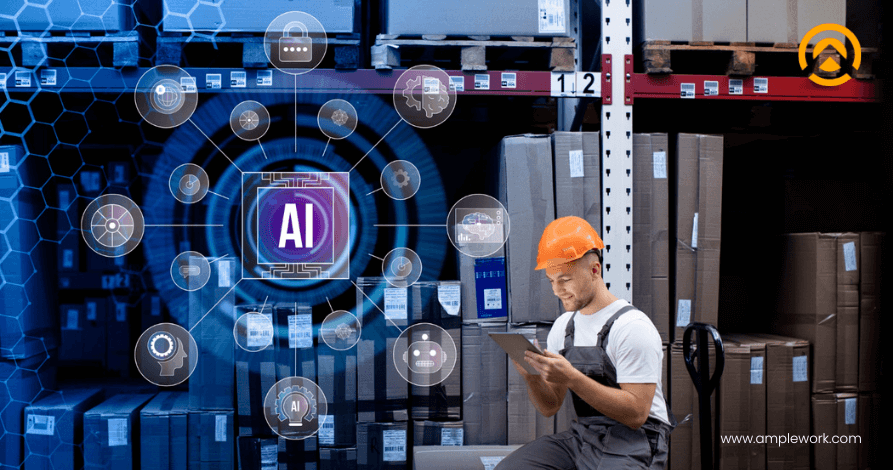Transforming Retail with AI in Retail: The Power of Personalized Supply Chains
Every field of the marketplace is getting equally advanced and technically advanced solutions are getting major attention in the retail sector. The integration of highly rated techniques such as Artificial Intelligence works on bringing top innovative solutions. Such AI-aided solutions can work to make retail processes more advanced as these solutions hold the capacity to make retail processing advance from personalization to supply chain optimization practices. Artificial intelligence is an umbrella term that involves different sub-technologies that offer a great variety of technical solutions.
With these solutions, any retail organization can gain the benefit of gaming proper customer satisfaction. Understanding, anticipating, and catering to individual preferences leads to establishing better-personalized practices. Along with this, the practice of supply chain optimization adds advantages like problem predictions, effective decision-making, forecasting different factors of product demand, taking care of security and compliance, reduction of inefficiencies, and optimizing inventory management. The AI inclusion in the retail industry is completely revolutionary, as the research data by Grand View Research highlights the same.

According to the above figure, the global artificial intelligence market recorded a growth aspect of USD 136.55 billion in 2022. Which is expected to grow at the compound annual growth rate of 37.3% within the timeframe of 2023 to 2030. Within both these categories of solutions and services, the industries involved are automotive, retail, finance, manufacturing, and healthcare.
The artificial Intelligence retail sector makes many things possible as compared to traditional resources. This blog is all about completely involving AI practices within the retail industry. In which different variations of artificial intelligence in retail business are highlighted along with their respective benefits. So give this a quick read and understand the epic role of AI in the retail sector.
Practices Associated with AI in the Retail Sector
1. Demand Forecasting
AI in the retail industry revolutionizes demand forecasting by leveraging advanced algorithms that analyze historical data, market trends, and external factors. Machine learning models adapt dynamically, enhancing accuracy over time and aiding businesses in anticipating market demand with unprecedented precision. Additionally, AI enables real-time adjustments to forecasts based on emerging trends, seasonal variations, and even unexpected events, providing organizations with the agility needed to respond to dynamic market conditions and customer preferences effectively.
2. Supplier Relationship Management
AI analyzes supplier performance data, predicting potential issues and identifying improvement opportunities. Natural language processing (NLP) enhances communication by conducting sentiment analysis, fostering stronger and more efficient relationships with suppliers. Furthermore, AI-driven tools can assess market conditions and supplier capabilities, assisting organizations in strategic sourcing decisions and optimizing the entire supplier ecosystem for better collaboration and efficiency.
3. Logistics and Transportation
AI-driven route optimization algorithms enhance transportation efficiency, reducing costs and improving overall supply chain performance. This can be treated as an effective logistics distribution solution. Predictive maintenance using AI ensures that vehicles undergo maintenance proactively, minimizing downtime and maximizing fleet reliability. Additionally, AI can provide real-time tracking and monitoring of shipments with distribution logistics software development practices and solutions. That works on allowing for better visibility and management of the entire transportation network.
4. Warehouse Management with Machine Learning
AI, through robotics and automation, transforms warehouse operations by increasing speed and accuracy in picking and packing. Computer vision monitors inventory levels in real-time, optimizing order fulfillment and improving overall warehouse efficiency. Moreover, AI can analyze historical data on warehouse performance, identifying areas for improvement, and enabling continuous optimization of warehouse processes for increased productivity.
5. Risk Management
Artificial intelligence in retail business assesses and mitigates risks in the supply chain. With the utilization of monitoring geopolitical events and market changes. Predictive analytics identifies potential disruptions, allowing businesses to develop proactive contingency plans and enhance overall risk management. Additionally, AI can simulate different risk scenarios, helping organizations develop robust risk mitigation strategies and ensuring resilience in the face of unforeseen challenges.
6. Data Analytics and Visualization
AI analytics tools process vast amounts of data, providing actionable insights for decision-makers. Visualization tools, powered by AI, simplify the interpretation of complex data, enabling organizations to make informed decisions based on a clear understanding of their data. Additionally, AI can automate data cleansing and preprocessing tasks, saving time and ensuring the accuracy of the data used for analytics, thereby improving the reliability of insights generated.
7. Quality Control
Computer vision, with AI solutions, automates product inspection processes, identifying defects and ensuring adherence to quality standards. AI-driven sensor data analysis predicts equipment failures, reducing downtime and maintenance costs in quality control processes. Furthermore, AI can facilitate continuous improvement in quality control by learning from past data and adapting inspection criteria based on evolving product specifications.
8. Blockchain for Transparency
AI integrated with blockchain technology enhances transparency and traceability in the supply chain, ensuring product authenticity and reducing the risk of fraud. This combination of technologies promotes trust and accountability throughout the supply chain. Moreover, AI can analyze blockchain data to identify patterns and anomalies, providing an additional layer of security and enabling organizations to detect and respond to potential threats more effectively.
9. Order Processing and Customer Services
AI chatbots and virtual assistants streamline order processing and enhance customer service by efficiently handling inquiries. Natural language processing enables these tools to understand and respond to customer queries effectively, improving the overall customer experience. Additionally, AI-driven analytics can analyze customer behavior and preferences, providing insights that can inform personalized service and marketing strategies, further enhancing customer satisfaction and loyalty.
10. Collaborative Planning
AI facilitates collaborative planning by connecting various stakeholders in the supply chain, improving communication and coordination. This fosters a more agile and responsive supply chain, enabling businesses to adapt quickly to changes and optimize planning processes collaboratively. Moreover, artificial intelligence in the supply chain ecosystem can analyze feedback and performance metrics from different stakeholders, facilitating continuous improvement and fostering a culture of innovation.
Also Read: Technologies in Supply Chain Systems to Overcome Challenges & Improve Efficiency
Major Benefits of Adapting AI in the Retail Sector

Automation
Automation revolutionizes inventory management by harnessing AI’s predictive capabilities, enabling precise demand forecasting. This not only reduces the pitfalls of overstock and stockouts but also optimizes resource utilization. In customer service, virtual assistants and chatbots, powered by AI, transcend traditional limitations, offering rapid responses and personalized interactions tailored to individual preferences. Furthermore, the integration of automated checkout systems, backed by advanced computer vision, not only expedites the transaction process but also elevates the overall shopping experience through a seamless and efficient check-out journey. The synergy of these automated solutions reflects a commitment to operational excellence and customer satisfaction in the dynamic retail landscape.
Sustainability
This gains a powerful ally in AI, which transforms energy management through intelligent monitoring and adaptive environmental controls. Beyond reducing carbon footprints, accurate demand prediction by AI significantly minimizes waste, preventing overstock scenarios and the subsequent need for markdowns. AI’s role extends to supply chain transparency, where real-time tracking and information provision on product origins foster ethical and sustainable practices. This not only aligns businesses with environmentally conscious strategies but also resonates with consumers who prioritize sustainable choices. AI’s multifaceted contributions underscore its pivotal role in driving sustainability initiatives and forging a responsible path for the retail industry in the face of environmental challenges.
Loss Prevention
AI emerges as a stalwart guardian of security. Advanced surveillance capabilities enable AI to analyze real-time video data, swiftly detecting suspicious behavior and potential threats within retail spaces. Facial recognition technology adds a layer of sophistication, effectively identifying known offenders and significantly reinforcing loss prevention measures. The integration of AI into fraud detection further fortifies security protocols, as it diligently analyzes transaction data for patterns indicative of fraudulent activities. Through these multifaceted mobile applications, AI stands as a proactive safeguard against losses, fostering a secure retail environment and safeguarding both assets and customer trust with its vigilant and sophisticated security mechanisms.
Costs Effective Solutions
In the pursuit of cost-effective solutions, AI emerges as a strategic ally for retailers. Pricing optimization takes center stage, driven by AI algorithms that dynamically adjust prices in response to market trends and competitor actions. The automation of routine tasks stands out as a key contributor to operational efficiency, reducing reliance on manual labor and minimizing errors in various processes. Additionally, AI’s ability to facilitate smart resource allocation is pivotal, aligning investments precisely with customer preferences and prevailing market trends. These interconnected applications underscore AI’s role not just in cost savings but in orchestrating a finely tuned and responsive retail strategy, ensuring a competitive edge in the dynamic marketplace.
Effective Practice of Supply Chain Optimization
AI emerges as a transformative force, leveraging predictive analytics to finely tune operations. Accurate demand forecasting is a standout achievement, achieved through the amalgamation of historical data and external factors, effectively reducing excess stock and elevating overall customer satisfaction. Real-time monitoring of the entire supply chain stands as a beacon of efficiency, facilitating prompt identification and resolution of issues, ensuring unparalleled agility and responsiveness. In summary, the integration of AI into the retail sector not only optimizes supply chain practices but serves as a driving force behind enhanced efficiency, sustainability, and competitiveness in a market that continues to evolve.
Customer Satisfaction
AI bestows considerable advantages upon consumers, reshaping their retail encounters. Take chatbots, for instance; they become invaluable aids, guiding customers through store layouts swiftly and delivering personalized product suggestions. The incorporation of AI ensures a swifter, more efficient checkout process by tailoring recommendations to individual preferences. Through these customized interactions, businesses not only streamline the shopping journey but also communicate a dedication to customer contentment. AI-driven assistance not only saves customers time but also showcases a proactive approach, underscoring that businesses prioritize delivering the optimal experience. Essentially, AI serves as a catalyst for refining customer-centric practices and amplifying overall satisfaction within the retail landscape.
Read more: Single Page Application (SPA) Development: Elevating User Experience on the Web
Conclusive Outlines
In the realm of revolutionizing the retail sector with AI, from personalization to supply chain optimization, a significant transformation is underway. Tailored and cost-effective AI solutions designed for diverse markets are streamlining business interactions and transactions. The increasing demand for these efficient platforms is driving a surge in the number of AI developers and specialized organizations. Numerous startup projects have successfully navigated initial challenges, establishing positive reputations and continuously adapting to the evolving needs of retail operations.
Amplework proudly stands out as a reputable AI development company with over 5+ years of extensive experience in leveraging AI for retail transformation, spanning from personalized customer experiences to optimized supply chain processes. Our team consistently exceeds client expectations, having completed numerous development projects. Our unwavering commitment to reliability and trustworthiness has translated into a remarkable milestone, with our AI solutions facilitating seamless business interactions and transactions in the retail landscape. Explore our website to discover the exceptional AI solutions we provide for retail transformation. Partner with Amplework to harness the potential of advanced AI technology, simplifying your business interactions and transactions for growth and prosperity. Transform retail with AI, from personalized customer experiences to optimized supply chain processes.
Read More:- Artificial Intelligence in App Development



 sales@amplework.com
sales@amplework.com
 (+91) 9636-962-228
(+91) 9636-962-228





